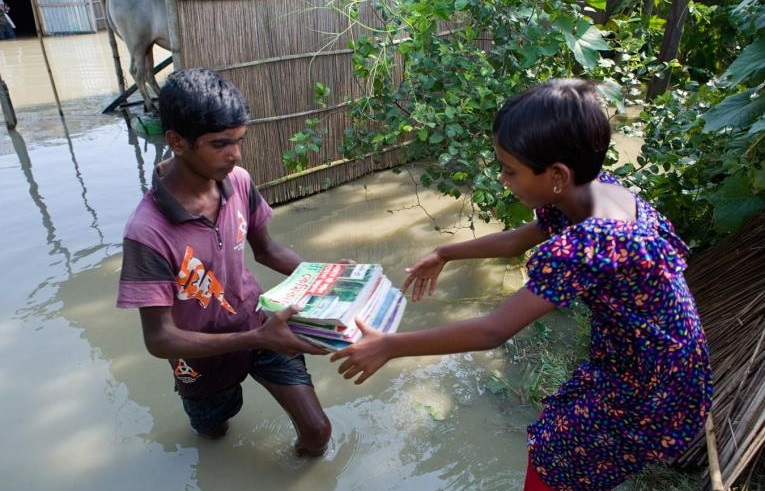Above 4M children need life-saving supports for floods in Asia
- Md. Kamruzzaman
- 24 July 2020, 10:28

The United Nations (UN) agency for children, UNICEF, in a statement issued on Thursday said weeks of torrential monsoon rains, widespread flooding and deadly landslides in Bangladesh, India and Nepal have affected millions of children and families.
“Over 4 million children are currently estimated to be impacted and in urgent need of life-saving support, with many millions more at risk,” said the statement.
Besides, over 700 people have died and dozens are still missing due to the floods, according to the statement.
"Even for a region that is all-too-familiar with the devastating impact of extreme weather, the recent heavy monsoon rains, rising floods and continued landslides are creating a perfect storm for children and families affected,” said Jean Gough, UNICEF Regional Director for South Asia.
Underlining the floods amid the pandemic as more painful than that of the previous years, she added: “The COVID-19 pandemic and containment and prevention measures add an additional complication to the mix, as COVID-19 cases are accelerating in some of the affected areas.” Meanwhile, emphasizing on caring for children as more important the statement said: “Over 700 people have died and dozens are missing in across the four countries, with continuing reports of children drowning.”
Measures such as physical distancing and handwashing need to be observed in order to minimize the risk of infections among affected populations, especially those in emergency shelters.
The statement also pointed out the challenges of the relief works in many floods-affected areas.
“Many areas remain inaccessible due to damage to roads, bridges, railways and airports. The most urgent needs for children are clean water, hygiene supplies to prevent the spread of disease, food supplies and safe places in evacuation centres for children to play.”
"The fall-out from the COVID-19 pandemic is being compounded by climate change and extreme weather events and are arguably the biggest issues affecting children in South Asia right now" Gough said, adding that immediate support, more resources and innovative programmes are urgently needed to address the challenges.
Above half million lost homes in Bangladesh
In Bangladesh alone, more than 2.4 million people are estimated to be affected by flooding, including around 1.3 million children.
More than half a million (548,816) families have lost their homes.
The statement also marked the timing of the floods as critical and said: “The flooding has come at a time when Bangladesh is still recovering from Cyclone Amphan, and its already stretched emergency and health response systems are working hard to contain the spread of the COVID-19 virus.
The COVID-19 deaths toll in Bangladesh on Friday surged to 2,836 with 35 new fatalities in the past 24 hours, and 2,548 new positive cases with total 218,658.
UNICEF is working closely with government partners, who are leading the flood response, and NGOs to provide urgently needed water, sanitation and hygiene supplies to children and communities in need, said the statement.
2.4M children affected India
In India, over 6 million people across Bihar, Assam, Odisha, Gujarat, Maharashtra, Madhya Pradesh, Kerala, Uttarakhand, Uttar Pradesh and West Bengal have been affected by the floods, including an estimated 2.4 million children.
Though flooding at this period of the year is common, this widespread scale of floods during mid-July is unusual.
At the same time, India has seen the daily number of COVID-19 cases crossing the 30,000 thresholds.
UNICEF is working with the Government and partners to respond quickly and effectively.
It is also supporting the Government of Assam to implement the COVID-19 adapted relief camp management guidelines and Child Friendly Spaces in select districts, in addition to its focused support for maternal and child health service continuity and COVID-19 response in many states.
100 died, 48 missing in Nepal
In Nepal, heavy monsoon rainfall has caused flooding and landslides across different parts of the country, impacting more than 20 districts, since 9 July.
“More than 100 people have died, 48 are missing and feared dead while 87 are injured,” said the statement.
Over 10,000 people - half of them children - have been affected with an estimated 7,500 displaced from their homes.
This same period has also seen a significant number of COVID-19 positive cases in Nepal.
UNICEF has so far been responding to the immediate needs in the central and far western areas of Nepal where landslides have occurred, providing blankets, tarpaulin, hygiene kits, buckets, mugs and water purification tabs.
Main highway damaged in Bhutan
In Bhutan, the monsoon rain has caused landslides across the country and is hampering transport and communication as the main highway and inter-district roads have been damaged.
The flashfloods were caused by the overflow of the seven streams and tributaries to the Mao river.
“The water levels in the Mao remains very high posing significant risks for more flooding.”
The flooding has also caused damage to crops and a water treatment plant. So far four people have died because of the flooding.


